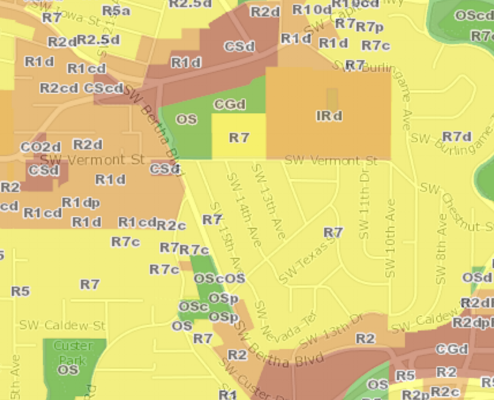WHAT YOU NEED TO KNOW (AND PROBABLY A BIT MORE)
 The joy of understanding zoning.
The joy of understanding zoning.
Depending on whether or not you’ve received snail mail concerning zoning changes, and depending on whether or not you read the fine print, your Portland home may undergo a change of zoning next year. This leads to a lot of questions and one very important piece of advice:
- Why is the zoning changing?
- When does the new zoning take effect and who does it impact?
- Where can I go for more information?
- Can I stop the change or change my current zoning?
- How does zoning work?
- What does this mean for home buyers and sellers?
- Most Important Advice Ever
1. Why is the zoning changing?
For the past ~8 years the Bureau of Planning and Sustainability (BPS) has been working on a new Comprehensive Plan for the City of Portland. This is a long range (20 year) planning tool that sets the framework for physical development in the city. Most of the legislative work is done but there are always additional projects in the works that you can comment on and provide testimony for (such as Central City 2035).
2. When does the new zoning take effect and who does it impact?
Approximately 24,000 homes will be affected by the zoning changes (including yours truly!). These changes are going to be effective on January 1st, 2018. However, there is the possibility that it could go into effect later than this date depending on the state acknowledgement process.
3. Where can I go for more information?
To find out whether or not any particular home will undergo a zoning change, you can visit this website. To find out what your current zoning is, visit this website and enter your address. Feel free to contact me for help and any questions you might have.
4. Can I stop the change or change my current zoning?
There’s no way that I know of to stop the zoning change if you are part of this particular update because it was adopted by the City Council in December of 2016. However, zoning changes all the time and there are a lot of factors to consider if you think your property should be zoned differently.
While your current zoning may not allow for the development that you want, your property may be part of future zoning changes (comp plan). If so, you may be able to go through a quasi-judicial process to apply for a zoning change which will have a good chance of success. Otherwise, you can apply for a change of zoning but there is absolutely no guarantee of success. Either of these processes carries a high cost and should be carefully considered. Input from professionals is crucial.
5. How does zoning work? (high level overview)
Your base zone may be something like R2.5 or R5. R means residential and the number corresponds to the number of units that can exist per thousand square feet (2.5 = 1 unit per 2500 square feet). Except when it doesn’t… don’t ask. It can be more complicated than this based on other rules, such as location (for instance a corner lot may allow for more density) and overlay zones (such as design overlay zones that require certain design elements). Specific overlay zones, plan districts, and other regulations will all impact the development potential for your property.
Zoning is (unnecessarily?) complicated so don’t expect to understand everything just from knowing what the code is for your zone. You can consult your realtor for help to better understand your situation.
 This is a zone map of a little piece of Portland. You definitely do not need to understand what all this means.
This is a zone map of a little piece of Portland. You definitely do not need to understand what all this means.
6. What does this mean for home buyers and sellers?
For buyers and sellers, zone changes can certainly impact the highest and best use for your property. A change from R1 to R5, R10 to R20, etc. may mean that a property no longer has the development potential it once had. Or the property may be changing to allow for higher density development. For a seller, knowing and understanding the current and planned zoning is crucial.
For buyers, understanding the zoning of both the home that you are interested in, as well as all the neighbors, can make a huge difference in whether or not it makes sense to buy the property. For instance, the home you are wanting to buy might be zoned for lower density residential but the corner lot next to it may be zoned for higher density development. Even if that corner lot only has a single level house on it now, it could be developed into a 3-story complex in the future!
Most Important Advice Ever (well, maybe not ever but it’s still good advice)
There’s a lot more to selling and buying homes than listing on the MLS or placing an offer. Find a real estate agent with the knowledge, smarts, and time that will do the work for you to maximize your dollars! (Along those lines, feel free to contact me anytime.)